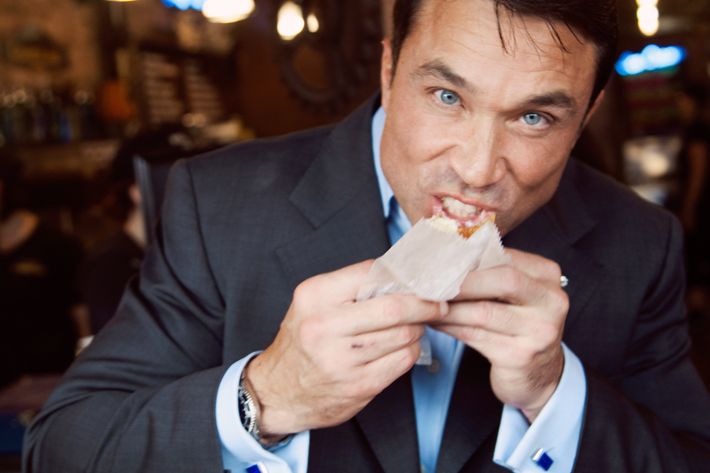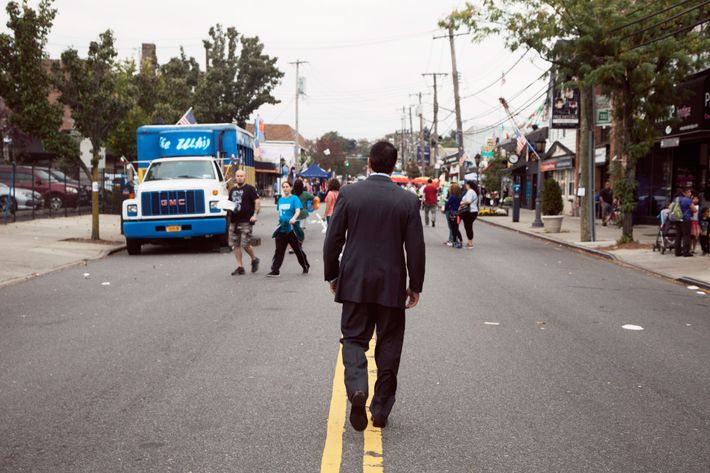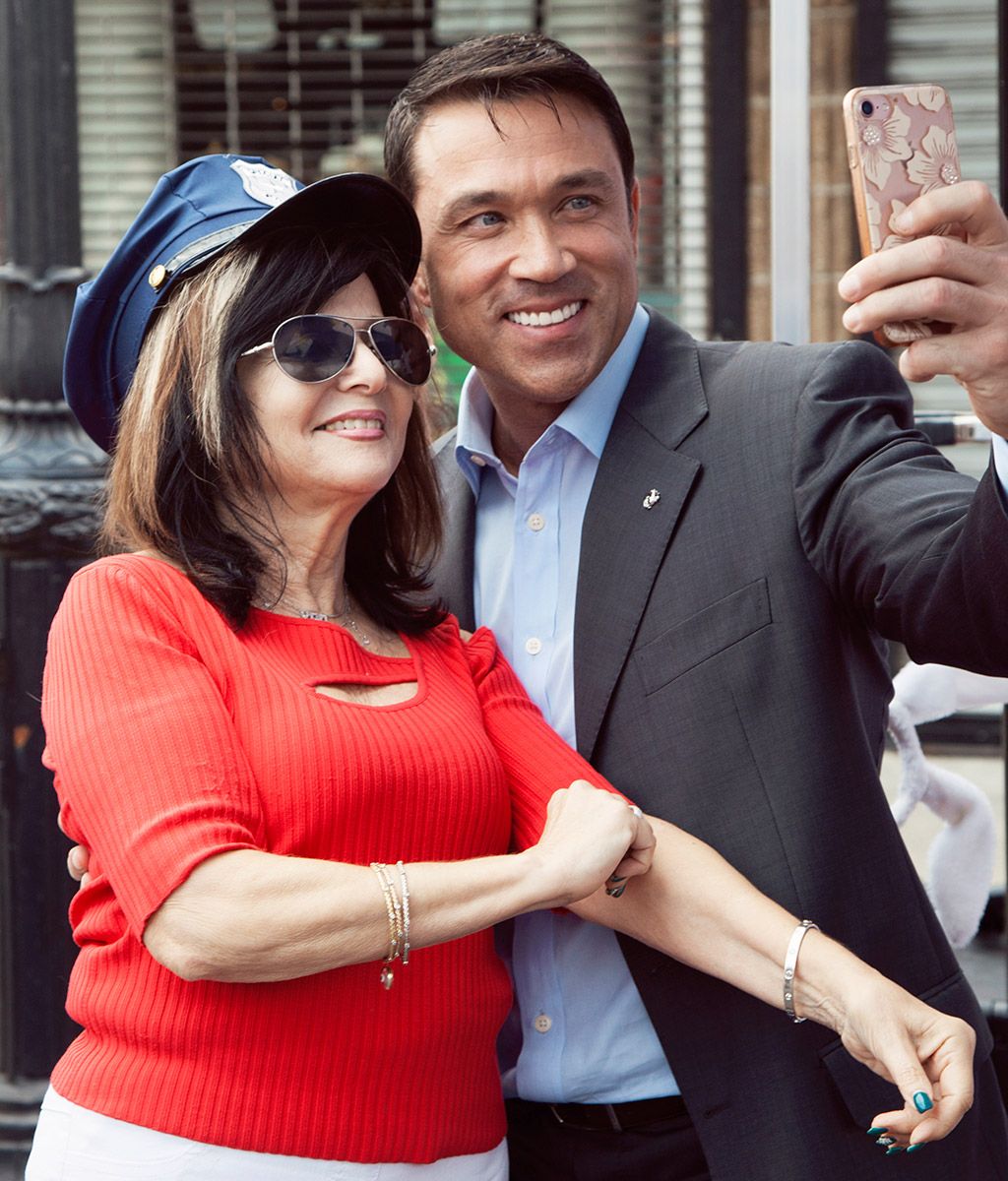It was Friday, which meant it was Michael Grimm’s cheat day.
The muscle mass he carried during his time as a Marine, an undercover FBI agent, and even as a congressman has, at age 47, become more difficult to preserve on his naturally slight five-foot-ten-inch frame. To fight the atrophy — made worse by the strain of an investigation; indictment; guilty plea; felony conviction; seven months spent in prison in Nowheresville, Pennsylvania; and another month on house arrest — he exercises diligently and follows a high-protein, low-carb diet.
He works out at the gym. He boxes. He runs three miles four times a week. He ingests a notable quantity of meat, from chicken breasts and chicken cutlets he breads and fries himself to filet mignon he cooks on the grill to his mother’s meatballs (ground beef, breadcrumbs, an egg, garlic), which she also makes in miniature for Sebastian, her son’s not mysteriously fat Yorkie whom he calls “a bad boy” in a singsong voice.
But on Fridays, Grimm is the bad boy, free to consume all manner of meat-free substances if he so chooses, which on this particular overcast Friday the 13th, he did. On Richmond Avenue in Staten Island, he sat in the booth of a diner wearing a subdued blue suit lined with bright-blue silk, and gave his order to the waitress: tea with half-and-half, French toast, and scrambled eggs. He drowned the toast in maple syrup. His dark hair is cropped and sculpted with product, framing his blue eyes and unusually hexagonal face. In Crayola parlance, his skin is somewhere between raw sienna and atomic tangerine, and it shows little sign of wear.
“You know,” he said, considering his order, “when you’re campaigning, every day’s a cheat day.”

Rarely does a man wear a suit to a diner in the middle of a workday without politics on his mind. Two weeks earlier, on October 1, Grimm entered the Republican primary here in the 11th congressional district, which spans all of Staten Island as well as the Brooklyn neighborhoods of Bay Ridge, Bensonhurst, Gravesend, and Dyker Heights. It’s where he was first elected in 2010 with no experience but with considerable support from the Tea Party and prominent conservative figures — George H.W. Bush, John McCain, Sarah Palin, Rudy Giuliani, and Chris Christie — who embraced his law-enforcement credentials and shrugged at his platform opposing Business As Usual in Washington. The New York Post noted his lack of “specifics” when it came to “the issues.”
In the end, issues would hardly matter. Grimm owned one of the most centrist records in the 111th Congress. And then, after only four years in office, he resigned and assumed a new title: inmate 83479-053. He pleaded guilty to one count of tax evasion after first being hit with a 20-count indictment related to his Upper East Side restaurant — mail and wire fraud, filing false tax returns, perjury, hiring and employing undocumented immigrants, and so on. The establishment was called Healthalicious, and for four years before arriving in Washington, he was in the business of serving delicacies he called “gym plates,” post-workout shakes and, obviously, a variety of animal and plant proteins. “I’m not creative, okay?” he told me of the batshit name. “I wanted to combine healthy and delicious — I nailed it.” He laughed. “From a marketing point of view, people remember a silly name.” But to the extent that Grimm was remembered at all outside of Staten Island once leaving Congress, it wasn’t for Healthalicious or any victimless crimes he allegedly or admittedly committed during his stint as Meathead Emeril. It was for threatening to throw a local NY1 reporter “off the fucking balcony” in the rotunda and, somewhat repetitively, to “break” him “like a boy.” (He told me of that incident: “It’s perceived as if I was out of control in some way. I was 100 percent in control.”)
In a more sane time in our political history, that might have been it for Michael Grimm’s political career. Maybe he’d have gotten lucky and ended up a Fox News pundit, or on the speaking circuit somewhere, or quietly and legally running Healthalicious 2.0. Fuhgeddabout holding office again as an ex-con best known for threatening graphic violence against a TV reporter as cameras rolled. But the sane times are over. In the ensuing handful of years, as he served his time in prison and got out, American politics came unglued in such a way that invited his return.
Grimm watched the 2016 election from the sidelines. He’s never attended a Trump rally and, as a felon, couldn’t vote for him. Instead, he drove down to D.C. in his Buick to watch the results come in at a friend’s party at the Capital Grille. But his political instincts remain sharp. In a district where 90 percent of likely Republican primary voters, according to an internal campaign poll, assess Trump favorably, he’s decided to market himself as the president’s kindred spirit. And just like in his first campaign, he’s attached himself to the conservative movement of the day: far-right populism — specifically, the variety evangelized by Steve Bannon. The Breitbart empresario is supporting Grimm’s candidacy in an effort to fulfill his promise to challenge every Republican in Washington with the exception of Ted Cruz. “Staten Island’s very much like the Rust Belt. It’s like Pennsylvania, it’s like Michigan, it’s like Ohio. These are places where the forgotten man is everywhere,” a source close to Bannon told me, by way of explaining his involvement. “When’s the last time one of those politicians, or one of those national media figures — with the exception of yourself which, congratulations for actually doing journalism and taking the ferry over to Staten Island from Manhattan …” I’d taken an Uber, I said. “You took an Uber, but you get what I’m saying. Does anybody go there? No, they go to Manhattan and they pal around in midtown. Midtown’s a great place, don’t get me wrong.”
But there is a minor complication with Grimm’s theory of the race: Dan Donovan, his opponent, has known the president for 20 years and maintained what he calls a friendship with him. He’s almost always voted in favor of Trump’s agenda, too, and in the rare cases when he hasn’t, Donovan said he’s explained his reasoning to Trump face-to-face in the White House, where he’s often welcomed as a guest. As further proof of just how close he is to the president and his power, he told me (and tells everybody) that he was a passenger on Air Force One the afternoon that Reince Priebus was fired. “As I was leaving his office — he has an office on Air Force One — as I was leaving that office, he asked me to come back and he asked me what I thought of General John Kelly,” Donovan said. “I said to the president, ‘I think General Kelly is a patriot and an American hero,’ and the president said to me, ‘Well, in about 20 minutes I’m going to name him my chief of staff.’”
Grimm admits he’s only met Trump a few times, and never in a meaningful way. As a congressman, he’d visited the president’s Trump Tower office as a formality more than anything else, just like every other New York politician. But his impression of Trump, he told me, was a lasting and positive one — so positive, in fact, that if the president were the kind of person who paid close attention to his press coverage, he might come across Grimm complimenting him effusively. “I remember saying to myself, I never realized what a large man — I mean stature-wise, he’s a big man, with massive hands,” Grimm said, outstretching his own regular hands above the table. “I don’t have small hands, but when I shook hands with him, the first time I shook hands with him, I realized he was a big man.” He sensed my skepticism. “He is!” he said, defensively. “I thought they were pretty big. You don’t think so? I thought he had a big, strong grip. I’m dead serious.” He went on about how Trump is “a pretty big guy” and “not a small man even for his height” and how his hands were “more like a workman’s hands” than those of “a CEO.”
Anyway, what Grimm is selling — a kind of cosmic bond between himself, the president, and his “real,” “regular,” and, “average” supporters — can’t be qualified with facts or statistics. It’s not even about policy. It’s a matter of the gut, the heart, and the hands, and well, isn’t that Staten Island?
He surveyed the spotty diner crowd for looks of recognition, his everyday run-ins with the people he still considers constituents his preferred means of polling his own favorability. “The person walking in, that wasn’t staged,” he told me, referring to an older married couple who stopped to shake his normal-sized hand. I hadn’t thought the encounter was staged before he announced that it wasn’t. “They met me at a block party,” he said. Each face he meets with a nod, or hand he shakes, or word of support he accepts, he registers as proof that he’s not embarking on a fool’s errand. An elderly man approached the booth. “What they did to you, they coulda done to anybody,” he told him. Many Staten Islanders who talked to Grimm during my time with him said similar things, often referring to his conviction as “a raw deal.” As Grimm listened to the man speak, his eyes fell to his forearms, which were decorated in tattoos he immediately recognized. The man told him he’d served in the Marines, too, before he was a cop, and then a teacher. He said he was 84. “You don’t look a day over 83!” Grimm said with a laugh. But the man’s tone was serious. “Just … get … elected,” he said.

By most measures, Donovan is just fine for Republicans here. But how he votes (conservatively) and what he stands for (run-of-the-mill conservatism) doesn’t seem to be enough to excite the local electorate. “He’s laid-back-ish,” former Borough President Guy Molinari, a longtime patron of Grimm, told me. “He’s not aggressive enough to help get real results.” More likely to fuck up in some spectacular way, but also more likely to make voters feel something, is Grimm, who bursts with emotion and testosterone in the tradition of working-class New York Italians — or half-Italians, as he’s part German and Irish. (In 2011, The New Yorker reported that, years before as an FBI agent, he’d improperly flashed his weapon in a nightclub, and urged all of the “white people” to leave as things escalated. Then and now, Grimm denies any wrongdoing and any racist remarks. He was, as he so often believes he is, wrongfully accused.) “If you’re the regular person on the street, the average person on the street, whether you drive a bus or turn a wrench or teach school, and you come to me and say, ‘I have a problem,’ and I tell you I’m gonna help,” he told me, his words quick and deliberate. “And I will resolve it. One way or the other. That’s what I’m known for.” He added, “There’s a reason why they don’t call me ‘congressman.’ They call me Michael,” explaining that the reason isn’t the obvious — that he’s not a congressman — but something more profound. “They know me,” he said, “I’m all in for them and they know it.”
Like Grimm, who once gave an interview consisting almost entirely of quotes from A Few Good Men and whose favorite movie is Rocky, Bannon has a flair for drama and seems to gravitate toward characters with a grasp of their own arc. Campaigns, after all, are exercises in storytelling; if enough of those stories hit similar themes, you may have yourself a compelling narrative. A former screenwriter, Bannon describes the state of American politics under his influence in 2017 as a “season of war.” After being fired as Trump’s chief strategist in August, he retreated to Breitbart News. From there, he has been waging war against the Republican Establishment, which he believes is fatally obstructionist. The strategy is to promote populist, conservative candidates to pick off weak or bland Republicans, especially those tethered to Mitch McConnell and Paul Ryan, the congressional leadership. In Bannon’s rhetorical paradigm, the struggle for the soul of the GOP boils down to good versus evil. What’s at stake is the very notion of freedom as he would like it to be.
It’s a surprising path given that Republicans hold the White House and both chambers of Congress. Newt Gingrich recently called Bannon’s plans the “wrong strategy” and wondered why Republicans would be targeted instead of Democrats. Karl Rove has expressed disapproval, too. The 11th is a swing district, and currently the only New York City seat held by a Republican; if Donovan loses or Grimm pushes him further to the right, Democrats stand a chance to flip it. But Bannon won’t concern himself with matters of partisanship; he’s a purist, more likely to burn everything down than learn to live with compromise.
“I think they’re doing the Lord’s work,” Grimm spokesman Michael Caputo said of Bannon and his main funders, billionaire Robert Mercer and his daughter Rebekah. “My understanding is they want to teach a lot of congressmen a lesson, and they need to be taught. There’s no price to pay for hurting the president, and I’ve never seen that before. If you opposed Barack Obama as a Democrat, you didn’t get your committee seat, wouldn’t get invited places. If you opposed Clinton on anything as a Democrat? You were in Siberia. In the Trump era, people earn stripes for it, and that’s bullshit. Because there needs to be a price to pay if you oppose your own president—because the president’s agenda is the Republican agenda. I don’t care if the House and Senate disagrees with him. It’s not their job. Their job is to deliver on the president’s agenda. If they don’t agree, shut the fuck up. Don’t work against him.”
Caputo is a longtime Republican operative. He worked on Carl Paladino’s chaotic gubernatorial campaign, and, most recently, as a communications adviser to the Trump campaign. Among reporters, he is known for his candor and a certain eccentricity unusual in politics (he resigned from the campaign after tweeting “Ding dong the witch is dead!” when Corey Lewandowski was fired, and he wears Grateful Dead cuff links, a nod to his days following the band around the country in between stints on campaigns). In July, Caputo — an ally of Paul Manafort — testified before the House Intelligence Committee, where he denied having contact or being aware of any other campaign officials who had contact with Russians. It was Caputo who introduced Grimm to Bannon, talking him up for two weeks ahead of their eventual meeting in Washington. “Well, you know, with Steve it’s mostly texts,” Caputo said of their communication. “I’ve just tried to define the man for him. Bannon is, like all veterans, predisposed for veterans.”
Still, Caputo said Bannon had some reservations about Grimm. “Steve’s like, ‘He’s a felon?’” Caputo’s job, as he understood it, was to “define Grimm in a way that would fit, that would help Steve get to ‘yes.’” That meant explaining that Grimm’s record wasn’t a problem, but an asset. “I spent my time helping him understand that this happened to Grimm long before it ever happened to Trump.” By that he meant drawing a parallel between Grimm’s investigation, indictment, and conviction, and the Russia investigations that carry implications for the two of them. “As somebody who’s spent $30,000 on lawyers, I’m not convinced that he’s guilty of anything. I think they weaponized the Justice Department against him,” Caputo said. “Bannon is facing the Russia investigation, which we all think is contrived, weaponized Department of Justice. I define the Grimm situation as very similar.”
But with all of that out of the way, what Bannon really wanted to know was, “Does he have a chance?” He asked Caputo for polling, which Caputo provided, along with other data and research. According to an internal memo, among 482 likely primary voters polled, Donovan leads Grimm 48 to 32 percent. Polling under 50 percent, the campaign believes, means Donovan is vulnerable. Further, Grimm’s favorability is 61 percent (Donovan’s is 79) which, given several years of bad press, they consider a feat. “Grimm’s immunity from the obvious attacks, combined with Donovan’s weak position as the incumbent and alignment with House leadership in opposition to the Trump America First agenda, set the stage for a clear victory in a GOP primary for the true Trump candidate,” the memo states.
Bannon met with Grimm on a Wednesday afternoon at the Washington, D.C., townhouse where Breitbart is headquartered (and where Bannon also lives). They spoke for, depending on who you ask, an hour and 15 minutes or merely 30 minutes. According to Caputo, the topics of the meeting were pragmatic — “fundraising, the horse race, the numbers, issues, opposition research on Donovan, and potential areas of cooperation between us.” Regardless, it was enough to win Bannon over. “Steve basically took it all in, asked a lot of questions, said, I’m with you, and, We can figure out how we can work together,” Caputo said. As Grimm was leaving, he and Bannon posed for a photo. Soon, Grimm released it on social media — a contemporary press release announcing he’d earned Bannon’s support.
“I think the guy is brilliant,” Grimm said of Bannon. But when he uses the jargon of the Trump era — “populism” or “fake news” — it sounds out of place in his mouth, like he’s just emerged Austin Powers–style after being melted out of a cryogenic freezer. “I never considered myself, necessarily, as … a … populist …” he told me. “But I guess I am, because whenever I had to form my opinions and platform it was by going out and meeting people in restaurants and in diners and different things.” Bannon, he added, thought he was a populist — and surely if anyone would know, it’d be him. “He basically said that he wants to support me, he likes that I’m straightforward. I think that he said I’m a fire-breathing populist or something like that.” And it doesn’t help that his understanding of his own policy positions is, at best, shaky. He admitted to hiring undocumented workers at Healthalicious, but he now claims to be in sync with the president on immigration. During a recent appearance on MSNBC, he struggled to answer a basic question about gun regulations. And in conversation, he’s prone to explaining what he believes the president “meant to say” by way of finding common ground with him.
As for what Bannon’s support means, it’s not totally clear. Grimm said he didn’t expect anything at all, that “just having his support means a lot to me.” A member of Bannon’s team wasn’t sure how support would manifest either. “I don’t know. That is not something that is figured out. As you know, Steve is meeting with tons of candidates every week. Depending on the race, support will mean different things.” This person also characterized Grimm as “brash-talking,” “aggressive,” and “a true-blue Staten Islander” — all good things, because “you could tell he wasn’t bullshitting.”
Another source close to Bannon explained the appeal this way: “He’s not necessarily the most conservative guy on the planet, but he’s more representative of the people of Staten Island than Dan Donovan.” Donovan, this source said, is “grown in a petri dish” by the conservative Establishment, and far too close to the Speaker to ever be acceptable to them. His voting record — 89 percent in line with the Trump agenda, according to a FiveThirtyEight analysis — is beside the point. “Who gives a shit?” the source said. “Those are dumb Washington talking points.” Such metrics were “cooked up” in “some talking-point machine” by “somebody that knows how to do correlations and can pass a high-school statistics class” who “works for Mitch McConnell, or Paul Ryan or one of these losers.” The source added, “It’s stupid. By the way, it’s stupid when the Republicans plant it against Democrats, too. ‘Oh, they vote 96 percent of the time with Elizabeth Warren!’ It’s like, Wow, you can do statistics! Who cares? They’re fucking idiots.”
Republicans on Capitol Hill are not enthusiastic about their former colleague’s plan to rejoin them. “I don’t know a single person here who wants him to run,” a senior Republican congressional source told me. This isn’t because Donovan is so well-liked, the source added, but because Grimm was hated and known as “a loudmouth punk.”
Donovan is skeptical that Bannon will actually do anything to influence the race. “I’m not sure what Mr. Bannon’s involvement or support is,” he told me. “You can see that very carefully, he did not say that he endorsed him.” He added that Grimm was liberal during his tenure in the House. “Mr. Bannon is not going to get the wool pulled over his eyes by Mr. Grimm,” he said. “Michael Grimm didn’t vote for Donald Trump because he lost the privilege of voting because of his criminal activity. And even when he was out of prison during the Trump campaign, you didn’t hear a peep out of Michael Grimm about supporting Donald Trump.” (When I asked the White House if the president planned to involve himself in the race, Press Secretary Sarah Huckabee Sanders told me she wouldn’t comment “due to the Hatch Act,” a 1939 law limiting political involvement by federal employees, with the exception of the president and vice-president. Richard Painter, a former White House ethics lawyer, told me Sanders’s response “makes no sense,” and further, he’d never heard of a press secretary invoking the Hatch Act to get out of answering a question about a president. “The White House should know what the president is doing and for the press secretary to disclose it does not violate the Hatch Act,” he said. When I pressed Sanders on this point, she eventually said, “We have nothing to announce at this time.”)
Grimm tells a story in which he’s a survivor of nefarious plots by Barack Obama and Loretta Lynch. “Anyone who thinks it’s an accident or a coincidence that two months into my indictment, she’s the attorney general, is not realistic,” he told me. When the Justice Department and the House Ethics Committee first began looking into Grimm, in 2012, he understood the probe to be related to his campaign and allegations he flouted the law in accepting certain donations. When the indictments came down, however, he learned the investigators had moved onto the restaurant that he’d since closed.
According to Grimm, he discovered that nothing was quite what it seemed when, 14 months prior to his indictment, he received an anonymous message on his desk in his Capitol Hill office. “Someone left a written note for me, I’m not even kidding you, saying, I’m on the other side of the aisle, I’ve overheard this conversation, a deal was made with Lynch, if she takes you down on anything she would be put to the top of — and this was in quotes — ‘short list for AG,’” he said. Although it was unsigned, he claimed he was able to determine who wrote it. He refuses to disclose that information now, and said he fed the evidence into a shredder immediately after reading it. “Someone put their neck on the line just to give me a heads-up,” he said, adding that he and that mystery someone spoke after his conviction. “They came up to me and said, ‘I’m really sorry what happened to you. I wish I could’ve done something but there’s nothing I could do.’” Looking back, he said, “To know that it was all political is a really tough pill to swallow, because it reminds me that I fought for my whole life for something that is not true or maybe not what I thought it was.”
Donovan refuses to entertain Grimm’s allegations, which he first promoted on a Breitbart radio show. “He doesn’t want for ego, that’s for sure,” he told me, almost in disbelief. Former DOJ spokesperson Matthew Miller similarly characterized Grimm’s claim as “absurd” and underscored his own admission of guilt. “He was investigated by career prosecutors and FBI agents, and the evidence against him was overwhelming,” Miller said. “Furthermore, he himself pleaded guilty — no one forced him to. He would be better off taking responsibility for his actions than making ridiculous claims with no basis in fact.”
Quietly, Grimm gave up fighting after he was indicted. He pleaded guilty and resigned from Congress after first vowing to his constituents that he’d be exonerated. He told me his plea came not because he thought he’d lose in court, but because of his conscience and sense of responsibility; years earlier, he promised his ailing father that he would care for his mother and sister in his absence. They’d had a difficult relationship — he was an anxious kid with a sensitive stomach and a fear of birds, while his father was a tough and complicated union roofer. Grimm told me he was committed to keeping his word, and that fighting the charges would have cost at least $500,000. Even his limited defense had left him broke. “I spent my entire life savings on lawyers,” he said. He served his time at McKean Federal Correctional Institute without visitors. “It was something I had to do on my own,” he said.

But he needed help in other ways. Petrina Grimm, Michael’s mother, sold her house in Queens to loan him $100,000 (an additional $20,000 came from Molinari, who told me he’d offered Grimm more but he wouldn’t accept it). She moved in with her son in Staten Island, along with Debbie, his sister, and Sebastian. (Grimm’s only marriage was annulled after less than a year in the mid-1990s, and he has no children.) “We didn’t follow politics very much,” Petrina told me of her family. Although she’d seen her son place himself in far more dangerous circumstances, like war and law enforcement, she had reservations about Washington. “Politics is a dirty business,” she said. When investigators fixed their attention on him, she thought it was unfair. And when he allowed his temper to flare, forever coloring the public’s impression of his character, she was disappointed. “I said, ‘You should’ve walked away,’” she told me. “And he reminded me a lot of my husband. Because my husband was just a street kid and he was used to fighting with people. But when you’re a congressman, you can’t do that.” Michael closed his eyes tightly for a moment. He told me he was sure he’d repay her and Molinari. “I take care of everyone,” he said. “All of this has taken a big toll on me. It’s made me a little cynical, which I don’t like, because I’ve never been cynical.”
A few days after we spoke at the diner, Grimm was at a street fair on New Dorp Lane. The Italian flag waved back and forth outside John’s Deli. A Walter White look-alike named Joe De Gennaro sat on a stool singing Sinatra in front of banners advertising FRESH PASTA and MOST FAMOUS ROAST BEEF IN ALL OF NEW YORK. Robert Funaro, who played Eugene Pontecorvo on The Sopranos and, more recently, Tony Del Greco on Vinyl, tried to convince me to try a sandwich. In this setting, Grimm immediately became 70 percent more Italian. His hand motions exaggerated, his volume a bit higher, and the pronunciation of his words rounder. “The gavone has to eat all day long. It’s why he’s so tall,” he said, referring to his aide, a lanky 23-year-old named Mark Grinko, who was feeling Italian here, too. “I’m Russian, and it even happens to me,” he joked.
Grimm made the rounds, shaking hands and posing for photos. He scanned tables to get a sense of whether or not an intrusion by a politician was welcome. When he got a look that suggested it was, he moved in, often sitting down for a few moments. He hugged every old lady. He smiled at every small child. He also seemed to personally know a large number of people on the street. “Are you eating small meals throughout the day?” Grimm asked Chris Matteo, the brother of a city councilman, who is jacked. Matteo said he was experimenting with fasting, which seemed to blow Grimm’s mind. His face curled into a De Niro–like registration of surprise. “If it works for you, it works for you,” he said. “Everybody’s different.”
But this is a campaign, which means every day spent among the people of Staten Island is a Friday for Michael Grimm. He walked over to Piece-a-Cake, a bakery next to the deli. “Let’s get a cream puff!” he said, then he nodded toward Grinko again. “The gavone over here’s gonna eat that!”































